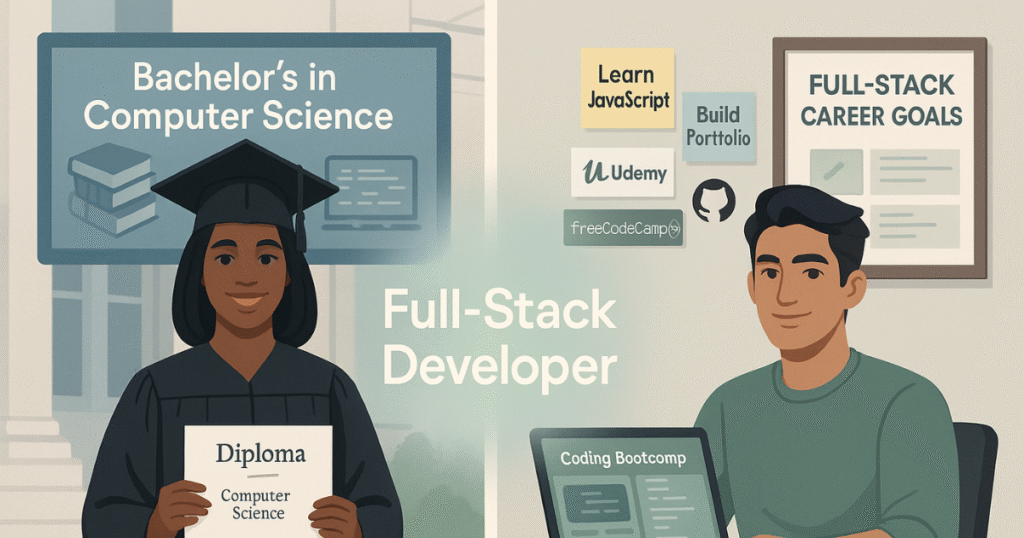Exclusive digital marketing services, 100% Satisfaction, and Money Back Guarantee! Learn More
In today’s tech-driven world, the question Do you need a degree to become a full-stack developer? is more relevant than ever. Traditional paths like computer science degrees are no longer the only gateway into the tech industry. With the rise in industry demand for full-stack developers, many employers are focusing more on practical skills than formal education credentials. Software engineer roles now span diverse backgrounds, and as tech hiring trends evolve, especially in the job market of 2025, real-world ability increasingly outweighs academic pedigree.
Understanding the Full-Stack Developer Career Path
The full-stack developer career path offers dynamic opportunities, ranging from startups to large-scale enterprise teams. These professionals are equipped to handle front-end and back-end integration, offering a holistic approach to web application development. Career progression typically includes roles such as:
- Junior Full-Stack Developer
- Front-End or Back-End Specialist
- Full-Stack Engineer
- Tech Lead or Solutions Architect
As demand surges, job progression is often tied more to your skillset and project portfolio than the degree listed on your résumé.
Coding Bootcamp vs. Computer Science Degree
When comparing a coding bootcamp vs computer science degree, each path offers distinct pros and cons.
- Duration: Bootcamps last 3–6 months, while degrees take 3–4 years.
- Cost: Bootcamps typically range from $5,000–$20,000; college tuition often exceeds $50,000.
- Curriculum: Bootcamps focus on job-ready tools like JavaScript, React, Node.js, and databases. Degrees cover theory, algorithms, and math-heavy topics.
- Time to Hire: Bootcamp grads often get hired within months, especially in entry-level roles.
Ultimately, education ROI depends on your career goals and preferred learning style.
The Rise of Self-Taught Full-Stack Developers
More people are becoming self-taught full-stack developers thanks to the availability of self-paced learning resources. Platforms like freeCodeCamp, The Odin Project, and YouTube tutorials offer a robust starting point. Many developers have built careers through open-source contributions, GitHub portfolios, and community engagement. In fact, some hiring managers now view active online portfolios and participation in developer forums as equally important as traditional credentials.
Online Certifications and Technical Skills That Matter
Online certifications for web development can enhance your credibility. Platforms like Coursera, edX, and Udemy offer certifications in full-stack development. Key technical skills required for full-stack development include:
- HTML/CSS & JavaScript
- React or Vue for frontend
- Node.js/Express for backend
- MongoDB, PostgreSQL, or MySQL
- Version control systems (Git)
- Cloud deployment (AWS, Netlify, Vercel)
- REST APIs
Learning full-stack tech like the MERN stack can make you job-ready faster, especially if combined with hands-on practice.
Proving Your Skills – Portfolios and Projects Matter Most
Nothing beats a strong portfolio when proving your skills. Employers are looking for developers who can build and launch real applications. Portfolio projects for job readiness should demonstrate:
- Responsive design principles
- Clean, documented code in Git repositories
- Real-world functionality (e.g., login systems, CRUD operations, API usage)
- Technical test projects
➤ If you’re aiming to build real-world apps, look for hands-on experience through internships or freelance custom website development services.
Can You Land a Job Without a Degree?
Yes, you can absolutely land entry-level web developer jobs without a degree. Thanks to skills-first hiring approaches, companies prioritize ability over academic background. Candidates who showcase projects, contribute to open source, and pass technical assessments often outperform degree holders with less practical experience. Prepping for coding interviews, system design questions, and take-home challenges is key to making your mark.
Alternative Learning Paths in Tech
Alternative learning paths in tech are booming. Aspiring developers can now choose from:
- MOOCs (Massive Open Online Courses)
- YouTube coding channels
- Online developer communities like Stack Overflow, Reddit, and Discord
- Peer-learning cohorts and hackathons
Courses on platforms such as Udemy, Coursera, and Scrimba cover beginner to advanced content and are often updated faster than traditional curricula.
Conclusion
So, do you need a degree to become a full-stack developer? The short answer: no. Whether you pursue a bootcamp, go the self-taught route, or follow alternative learning paths, the tech industry values demonstrable skills over degrees.
➤ Whether you’re degree-certified or self-taught, aligning your skills with professional website development services gives you a competitive edge.
In 2025 and beyond, a strong full-stack developer career path hinges more on what you can build, not where you studied.
